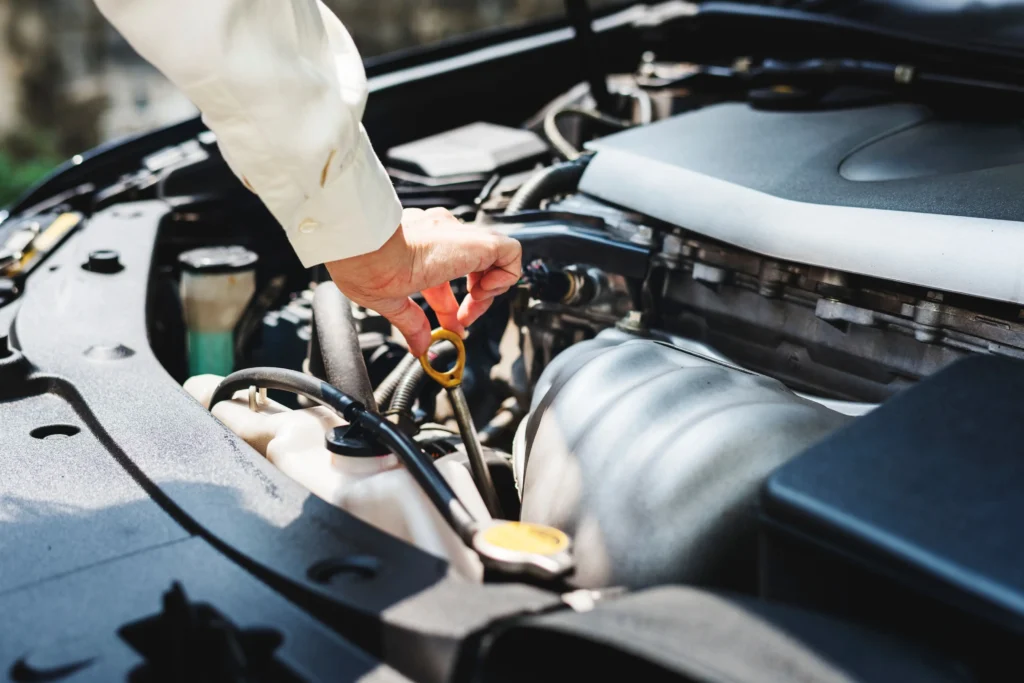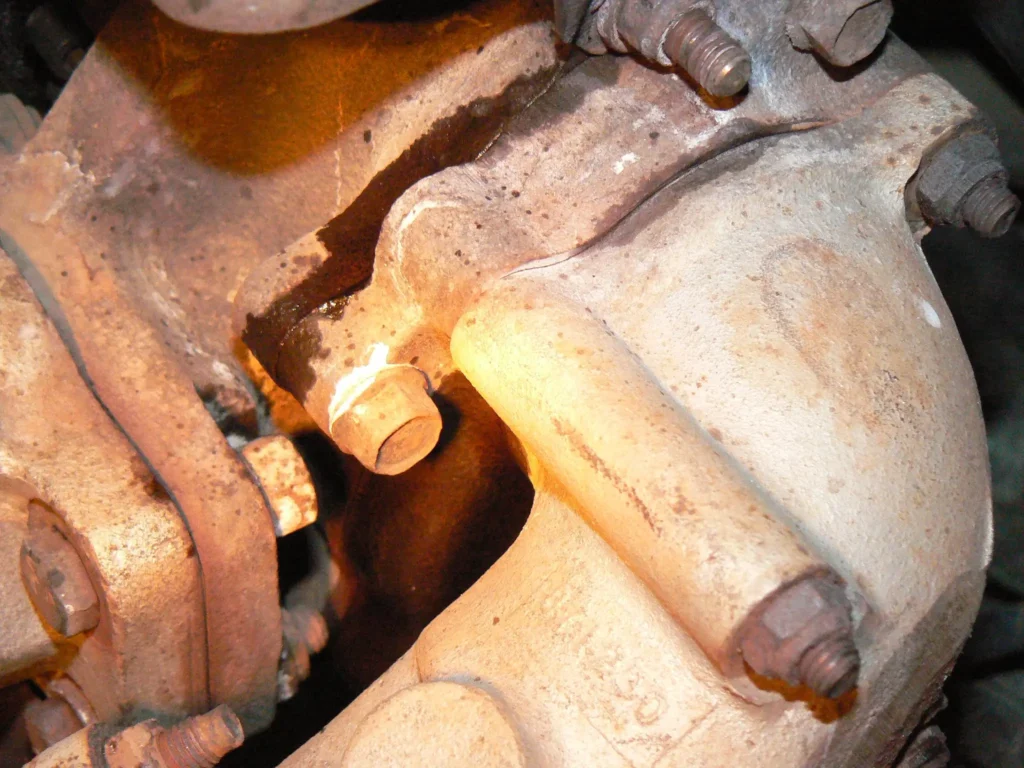Experiencing a burning oil smell after an oil change can be a concerning and frustrating experience for any vehicle owner. While a certain level of residual odor is normal, persistent or worsening smells often indicate a more significant problem that requires prompt attention.
In this comprehensive guide, we’ll delve into the common and not-so-common causes of that acrid burning scent, provide step-by-step troubleshooting advice, and share effective strategies to eliminate the issue and keep your engine running optimally.
Expected Causes of the Dreaded Burning Oil Smell
When you first start your car after an oil change, it’s not uncommon to notice a slightly unpleasant aroma wafting from the engine bay. This is typically nothing to be overly concerned about, as it often stems from a few expected and benign sources:
Spilled Oil on the Engine It’s practically impossible to complete an oil change without a few drops ending up on hot engine components. As this residual oil burns off, it can create a temporary burning smell.
Oil Films on the Exhaust Over time, blow-by gases coat the exhaust system in a micro-film of oil. A fresh oil change can liberate this buildup, leading to short-term burning smells.
Header Contact Some modern engines with tight tolerances may experience header contact with the oil pan, causing minor burning as new oil displaces any existing coating.
Overfilling Too much oil added during the service can lead to oil foaming and blowing past the pistons into the combustion chambers, burning off until the level drops to normal.
So a little bit of that unpleasant burning odor right after an oil change is generally normal and nothing to worry about. However, if the smell persists or worsens, it’s time to take a closer look under the hood.
Significant Causes of Persistent Burning Oil Smells
While a minor post-service smell is to be expected, lingering or severe burning oil odors indicate more serious underlying issues that require diagnosis and repair. Some of the common culprits include:
Low Oil Level Failing to fill the engine with the proper amount of replacement oil, or oil leaking out, can lead to oil starvation in certain areas, increasing heat and causing continuous burning.
External Leaks Leaks from components like valve covers, oil pans, or hoses allow oil to drip onto hot exhaust parts, manifolds, and catalytic converters, leading to constant burning.
Clogged PCV System A blocked crankcase ventilation system can cause excessive pressure, forcing oil mist past the pistons and into the combustion chambers to be burned off.
Damaged Seals and Gaskets Compromised seals, such as valve cover or oil pan gaskets, can introduce excess oil into the combustion path, resulting in continuous burning.
Excessive Blow-By Worn pistons, rings, cylinders, and valve guides can allow an excessive amount of blow-by gas, carrying oil residue into the chambers to be burned.
Header Gasket Leaks Leaks between the header and cylinders can let oil enter the hot exhaust stream, leading to a strong, persistent burning smell that worsens as exhaust pressure forces more oil past the leak.

To help distinguish the common and more serious causes, consider the duration and intensity of the burning odor, as well as any accompanying symptoms:
| Cause | Smell Duration | Severity | Other Symptoms |
|---|---|---|---|
| Residual Oil | Temporary | Mild | No other issues |
| Oil Overfill | Gradually improves | Moderate | High oil level on dipstick |
| Low Oil Level | Persistent | Strong | Oil level low on dipstick |
| External Leaks | Constant | Strong if near heat | Visible oil drips |
| Clogged PCV | Constant | Moderate | May smoke from dipstick tube |
| Damaged Seals | Constant | Moderate | Oil consumption uptick |
| Excess Blow-By | Constant | Strong | Blue smoke from tailpipe |
| Header Leak | Constant | Very strong | Oil loss without external leaks |
By paying close attention to the smell characteristics and any other symptoms, you can start to narrow down the potential causes and take the appropriate troubleshooting steps.
The Risks of Driving with Burning Oil Odors
It may be tempting to ignore that persistent burning oil smell, especially if it doesn’t seem to be causing any immediate problems. However, doing so can lead to significant short-term and long-term engine damage:
- Oil Starvation: The oil starvation caused by leaks or low levels can quickly wipe out critical bearings, leaving metal-on-metal components grinding against each other.
- Gummed-Up Components: Burnt oil residues can build up on pistons, valves, and exhaust parts, leading to decreased performance and efficiency.
- Rapid Wear: Excessive blow-by from worn components accelerates the degradation of rings, valve guides, and other critical engine parts.
- Catalytic Converter Fouling: Unburnt oil entering the exhaust can quickly clog and degrade the catalytic converter, requiring an expensive replacement.
- Compression Loss: Stuck piston rings from oil buildup can cause a significant drop in compression, leading to increased oil consumption and performance issues.
- Internal Damage: Corrosive exhaust leaks can slowly eat away at cylinder heads and other internal engine components over time.
Don’t make the mistake of assuming the burning smell will simply go away on its own. Diagnosing and repairing the underlying issue is crucial to prevent further damage and ensure your engine’s long-term health.
Diagnosing the Source of the Burning Oil Smell
To get to the root of the burning oil smell, it’s important to follow a systematic process of elimination. Start by closely inspecting the obvious potential problem areas:
- Check for Leaks: Thoroughly examine the engine, paying close attention to the areas around the headers, exhaust components, and oil filter for any signs of oil dripping or seeping.
- Inspect Seals and Gaskets: Carefully inspect the valve covers, oil pan, and other sealing points for cracks, dry rot, or other signs of deterioration that could be causing leaks.
- Monitor Oil Consumption: Track your oil level and consumption between changes to quantify any excess loss. More than 1 quart per 1,000 miles is generally considered excessive.
- Perform Compression and Leak-Down Tests: These diagnostic tests can help assess the condition of your engine’s internal components, including the piston rings and valves, to identify potential sources of blow-by.
- Inspect the PCV System: Check the crankcase ventilation system for any blockages or restrictions that could be forcing oil mist into the combustion chambers.
- Scope the Cylinders: If all the external checks don’t reveal the culprit, a borescope inspection of the cylinders may be necessary to identify any internal wear or damage.
By methodically working through this process, you can pinpoint the specific cause of the burning oil smell and develop an effective repair plan. Keep in mind that the source may not always be obvious, so don’t be afraid to consult a professional mechanic if you’re unsure or encounter any difficulties during the diagnosis.
Addressing External Leaks Causing the Burning Oil Smell
If the burning odor seems to be localized to a specific area of the engine, an external oil leak is likely the root cause. Here’s how you can go about addressing these types of leaks:
- Thoroughly Clean the Affected Area: Start by thoroughly cleaning the engine, paying special attention to the area around the leak. This will help you better identify the exact source of the dripping oil.
- Replace Worn or Damaged Seals and Gaskets: Carefully inspect the valve covers, oil pan, and other sealing points for any cracks, tears, or signs of deterioration. Replace any worn components to stop the leak at the source.
- Tighten Loose Fittings and Fasteners: Over time, vibrations and temperature changes can cause fittings and fasteners to loosen, leading to leaks. Properly torque all accessible bolts and fittings to the manufacturer’s specifications.
- Use a High-Quality Sealant (if Needed): In some cases, a persistent leak may require the application of a high-quality sealant or RTV silicone to fully stop the oil from escaping. Be sure to follow the product instructions carefully.
- Address Any Underlying Issues: Once you’ve stopped the immediate leak, it’s important to identify and address any underlying causes, such as worn components or damage, to prevent the issue from recurring.
Curing external oil leaks is key to eliminating the burning oil smell and preventing further damage to your engine. By taking the time to properly diagnose and repair the root cause, you can enjoy a fresh-smelling, well-maintained vehicle for miles to come.
Preventing Burning Oil Smells After an Oil Change
While some minor burning odor is to be expected after an oil change, there are several steps you can take during the service to minimize the risk of persistent or worsening issues:
- Use Splash Guards and Mats: Carefully position absorbent mats and splash guards around the engine to catch any drips or spills during the oil refilling process.
- Avoid Overfilling: Double-check the oil level and ensure you’re filling the engine to the proper “full” mark on the dipstick, without exceeding it.
- Inspect for Spills: Thoroughly inspect the engine, manifolds, and surrounding components for any residual oil after the service, and wipe away any drips or splashes.
- Verify the Correct Oil Specifications: Confirm that the new oil being added matches the manufacturer’s recommended weight and specifications for your vehicle.
- Check the PCV System: Ensure the crankcase ventilation system is clear of any obstructions that could lead to excessive blow-by and oil consumption.
- Monitor for Leaks: Keep a close eye on the engine for any new leaks or drips during the first few drives after the oil change, and address them promptly.
By taking these proactive measures, you can significantly reduce the likelihood of dealing with that pesky burning oil smell in the aftermath of your next service.
Frequently Asked Questions
Is it normal for a car to smell like burning oil after an oil change?
A: Some mild burning smell from residual oil and exhaust deposits is normal initially after an oil change. However, persistent or worsening burning odors indicate an issue that needs to be addressed.
Can I still drive my car if it smells like burning oil?
A: It’s generally not recommended to continue driving with a strong burning oil smell, as this can accelerate engine wear and damage. Try to identify and repair the underlying cause as soon as possible. Topping off the oil temporarily may help, but is not a long-term solution.
Why do I smell oil burning but see no leaks?
A: Internal engine issues like worn piston rings, valve guides, or a clogged PCV system can allow oil to be burned without any visible external leaks. Having a mechanic perform diagnostic tests like compression or leak-down checks can help pinpoint the source.
Why is my car burning oil after an oil change?
A: There are a few potential reasons why a car may start burning oil after an oil change: the new oil has displaced deposits that are now burning off, the oil level was incorrectly set, or there is an existing leak or engine wear issue that was exacerbated by the service.
How do I stop my car from burning oil?
A: To stop oil burning, you’ll need to address the underlying cause, which could involve:
- Replacing leaky gaskets and seals to stop external oil leaks
- Adjusting component positioning to eliminate contact points
- Clearing any blockages in the PCV system
- Addressing internal engine wear like worn piston rings or valve guides
Consistently following recommended oil change intervals and using the proper specifications can also help minimize oil consumption and burning.
Recommended Oil Change Kits and Leak Repair Products
To help you tackle that burning oil smell and keep your engine performing at its best, here are a few top-rated products available on Amazon that can come in handy:
Oil Change Kit – High Mileage Synthetic Blend This comprehensive oil change kit includes everything you need for a stress-free service, including high-quality synthetic blend oil, a premium oil filter, and necessary gaskets. Ensure you’re using the right specifications for your vehicle.
Oil Leak Sealer and Stop Leak Additive If you’ve identified an external oil leak as the source of the burning smell, this professional-grade stop leak formula can help quickly seal the affected areas and prevent further drips.
Compression Tester Kit For those who want to delve deeper into diagnosing the issue, this easy-to-use compression tester kit allows you to assess the condition of your engine’s internal components and identify any potential wear or damage.
Remember, while these products can be helpful, it’s always best to consult a professional mechanic if you’re unsure about the root cause or feel uncomfortable undertaking the repairs yourself. Catching and addressing the problem early can save you from costly engine damage down the road.

